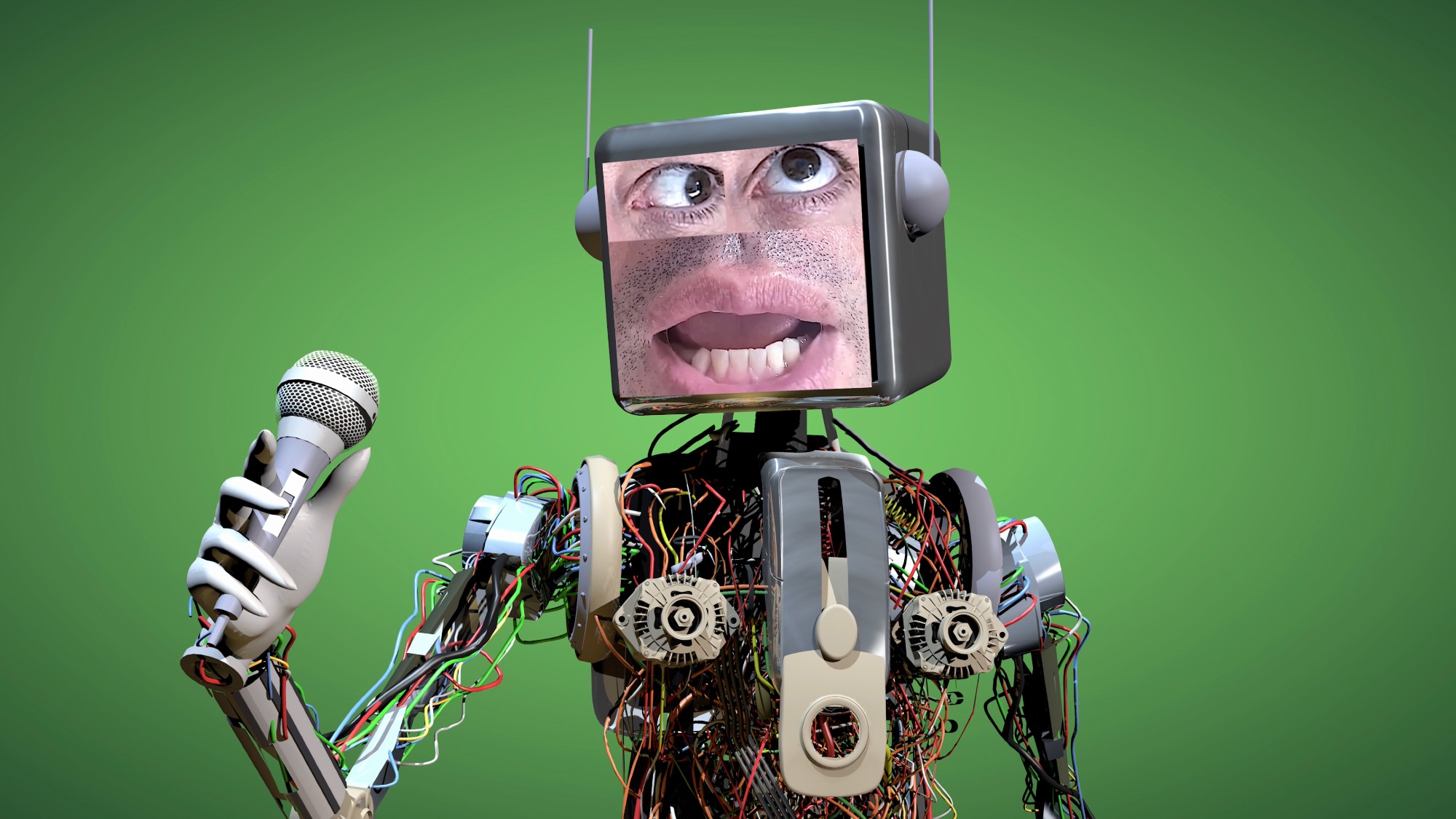There's one thing AI can't do: be funny
But will the technology's hilarity evolve? Some experts think so.


A free daily email with the biggest news stories of the day – and the best features from TheWeek.com
You are now subscribed
Your newsletter sign-up was successful
Artificial intelligence is prolific. It can write academic essays, diagnose diseases and power self-driving cars. But lucky for those who fear the eventual dominion of robot overlords, there is one area where artificial intelligence falls flat: humor. This should hearten comedy writers, who worry AI may take their already-scarce jobs. "ChatGPT Doesn't Have Childhood Trauma," said the sign of one writer at the Writers Guild strikes last year, a rallying cry for those who do not believe AI can create meaningful art.
If you ask AI to be funny, it spits out clichés. "According to one 2023 study in which researchers asked for 1,008 'original' jokes from ChatGPT, more than 90% of replies were the same 25 jokes … none of which were original," said Mashable. AI can be funny unintentionally — "like the oblivious 'straight man' in sketch comedy" — but that is something else entirely. So why, with an endless breadth of knowledge at its disposal, is artificial intelligence seemingly incapable of making us laugh?
Why is AI unable to be funny?
Comedy is situational, contextual and sophisticated. Even a simple meme can require several layers of understanding to "get." While receiving her Ph.D. at Delaware University in 2021, Ishaani Priyadarshini wrote her dissertation about AI's apparent inability to decipher memes, according to Popular Mechanics. "Internet memes serve as excellent checkpoints to ensure humans have the upper hand over machines," Priyadarshini said to the outlet.
The Week
Escape your echo chamber. Get the facts behind the news, plus analysis from multiple perspectives.

Sign up for The Week's Free Newsletters
From our morning news briefing to a weekly Good News Newsletter, get the best of The Week delivered directly to your inbox.
From our morning news briefing to a weekly Good News Newsletter, get the best of The Week delivered directly to your inbox.
Humor is subjective, but AI has no subjectivity or personal feelings about anything. The best comedy is littered with emotional truths, yet as the Writers Guild sign noted, AI has no childhood trauma, no well of empathy or lived experiences to pull from. "Large language models can be taught to whip up passable formulaic material because the propagation of hack jokes relies on systematized pattern-recognition processes," said The Hollywood Reporter. "However, [experts] believe that original, path-breaking comedy will likely remain out of the conceptual reach of such machinery, at least in the near term."
Another challenge: Many comedy routines push the boundaries of propriety and political correctness, while "AI, a conservative technology, doesn't understand what taboos are, so it can't break them," said Guy Hoffman, a Cornell professor, to the Reporter. AI struggles to defy established norms because it has been programmed to follow them.
Will AI ever evolve to be funny?
Some experts believe AI could advance. A robot comedian named Jon went on a stand-up tour as part of a study by Oregon State University in 2020, though humans wrote and programmed his set list. It is "possible to evolve humor in something like the ChatGPT model by programming it to favor the incongruities and deviations from established norms that are the hallmarks of comedy," said Tony Veale, a professor at University College Dublin and the author of "Your Wit Is My Command: Building AIs With a Sense of Humor," to the Reporter.
"A language model uses probability to guide its choices," Veale said to the outlet. "You could adjust its probability controls, from the expected to the unexpected, since the dominant theories of humor have to do with taking ideas and subverting them."
A free daily email with the biggest news stories of the day – and the best features from TheWeek.com
AI has not been given much time to hone its craft, something most comedians do at open mics for years before finding success. Still, some experts say humans maintain a clear advantage. "It's a little bit like an alien watching a standup routine and saying 'oh, I can do that, I think I understand the pattern,'" Mark Riedl, a professor at Georgia Tech's Machine Learning Center, said to Mashable. "But [the alien] doesn't realize there's a lot more going on in the mind of the comedian and the minds of the audience."
Trust is another factor. "Studies have found that people rate humor as one of the tasks they trust humans with far more than AI, along with writing news articles, composing songs and driving trucks (all of which AI has some success in doing)," said Time Magazine.
The evolution of AI's hilarity could spell trouble, as its mediocre quips may eventually become passable enough to steal some comedians' jobs. "The consensus among experts is that AI, while a clear labor threat, will become a baseline tool for comedy writers, like a thesaurus or a search engine," said the Reporter.
Anya Jaremko-Greenwold has worked as a story editor at The Week since 2024. She previously worked at FLOOD Magazine, Woman's World, First for Women, DGO Magazine and BOMB Magazine. Anya's culture writing has appeared in The Atlantic, Jezebel, Vice and the Los Angeles Review of Books, among others.
-
 The Gallivant: style and charm steps from Camber Sands
The Gallivant: style and charm steps from Camber SandsThe Week Recommends Nestled behind the dunes, this luxury hotel is a great place to hunker down and get cosy
-
 The President’s Cake: ‘sweet tragedy’ about a little girl on a baking mission in Iraq
The President’s Cake: ‘sweet tragedy’ about a little girl on a baking mission in IraqThe Week Recommends Charming debut from Hasan Hadi is filled with ‘vivid characters’
-
 Kia EV4: a ‘terrifically comfy’ electric car
Kia EV4: a ‘terrifically comfy’ electric carThe Week Recommends The family-friendly vehicle has ‘plush seats’ and generous space
-
 Claude Code: Anthropic’s wildly popular AI coding app
Claude Code: Anthropic’s wildly popular AI coding appThe Explainer Engineers and noncoders alike are helping the app go viral
-
 TikTok finalizes deal creating US version
TikTok finalizes deal creating US versionSpeed Read The deal comes after tense back-and-forth negotiations
-
 Will regulators put a stop to Grok’s deepfake porn images of real people?
Will regulators put a stop to Grok’s deepfake porn images of real people?Today’s Big Question Users command AI chatbot to undress pictures of women and children
-
 Most data centers are being built in the wrong climate
Most data centers are being built in the wrong climateThe explainer Data centers require substantial water and energy. But certain locations are more strained than others, mainly due to rising temperatures.
-
 The dark side of how kids are using AI
The dark side of how kids are using AIUnder the Radar Chatbots have become places where children ‘talk about violence, explore romantic or sexual roleplay, and seek advice when no adult is watching’
-
 Why 2025 was a pivotal year for AI
Why 2025 was a pivotal year for AITalking Point The ‘hype’ and ‘hopes’ around artificial intelligence are ‘like nothing the world has seen before’
-
 Data centers could soon be orbiting in space
Data centers could soon be orbiting in spaceUnder the radar The AI revolution is going cosmic
-
 AI griefbots create a computerized afterlife
AI griefbots create a computerized afterlifeUnder the Radar Some say the machines help people mourn; others are skeptical
